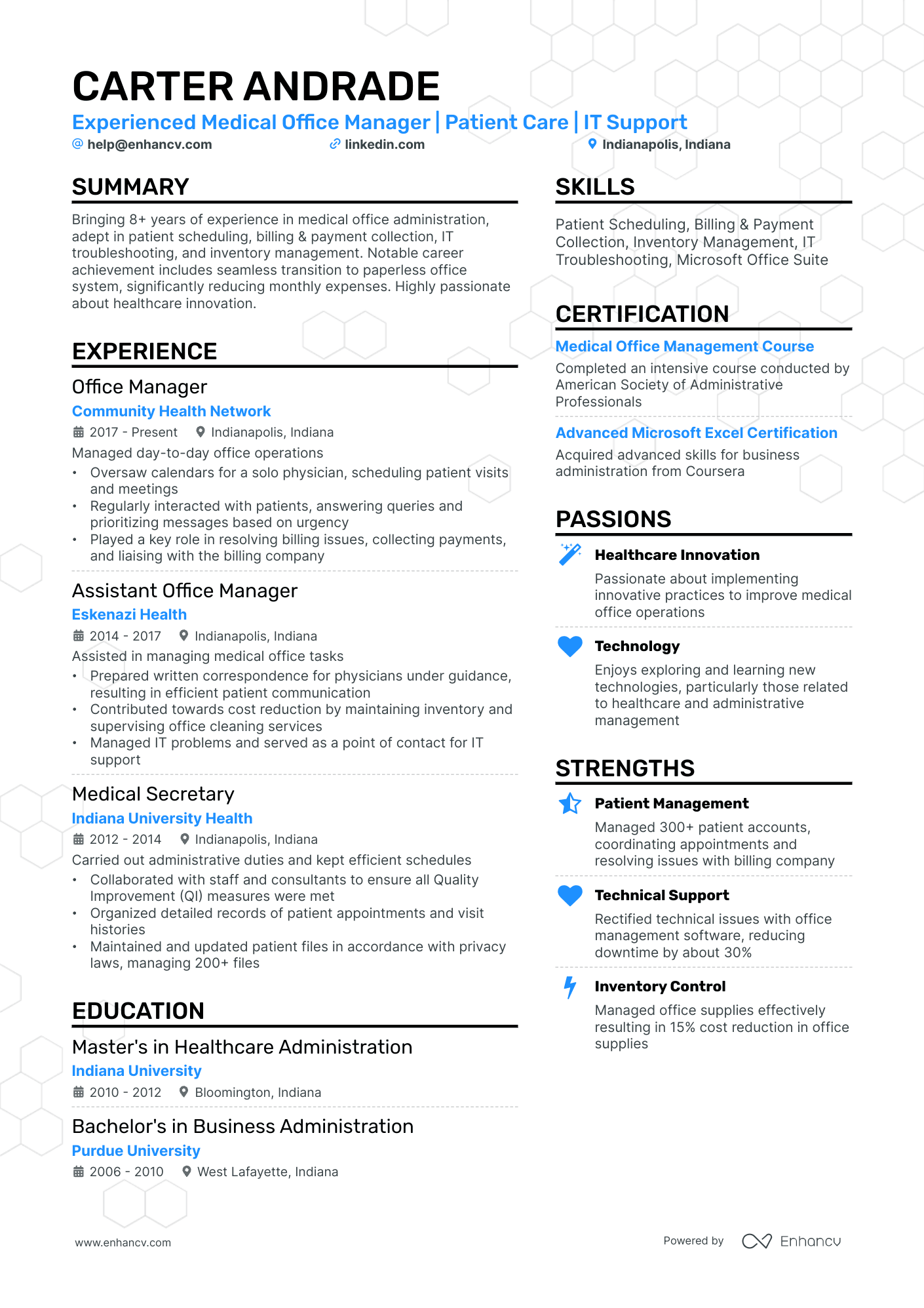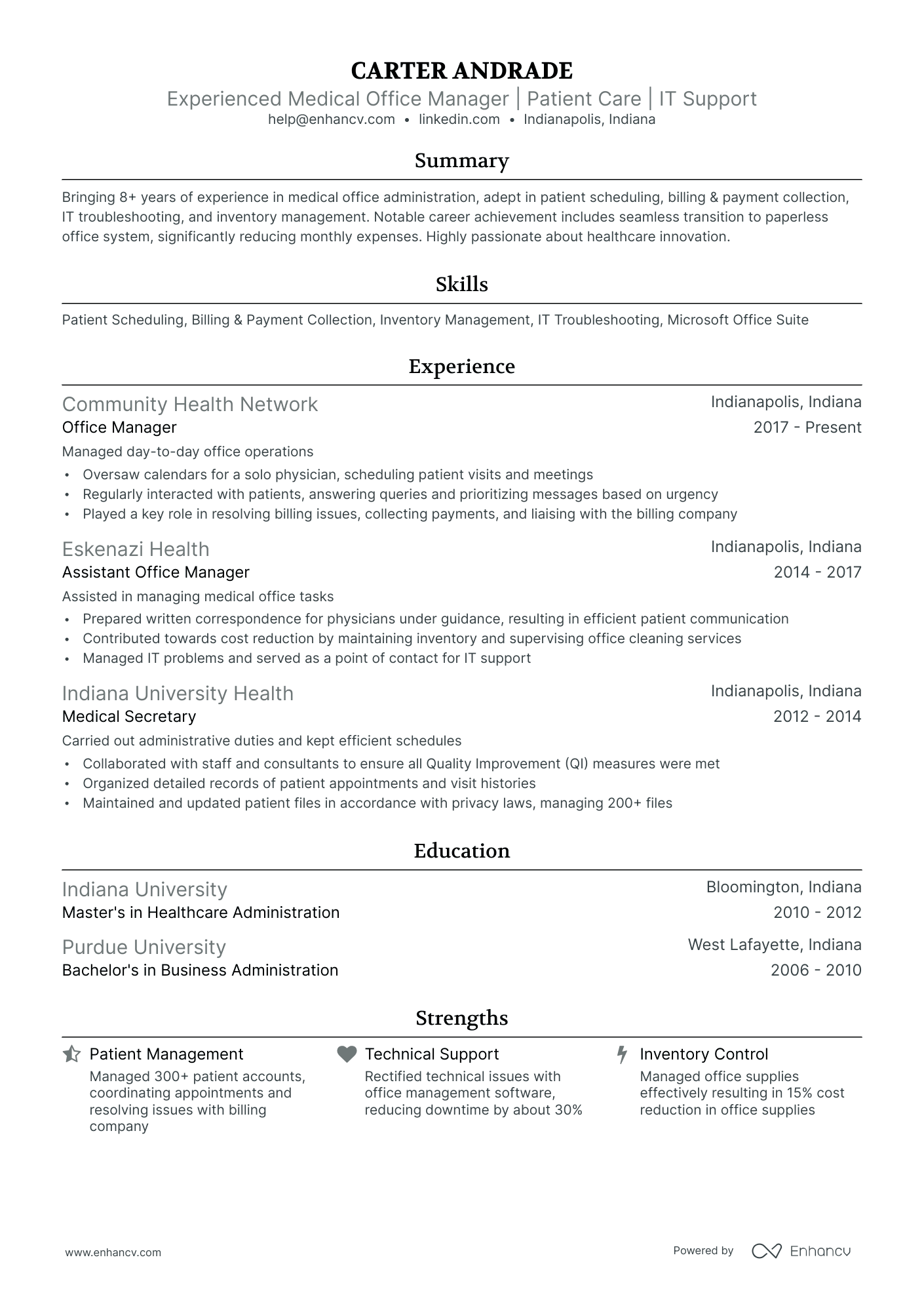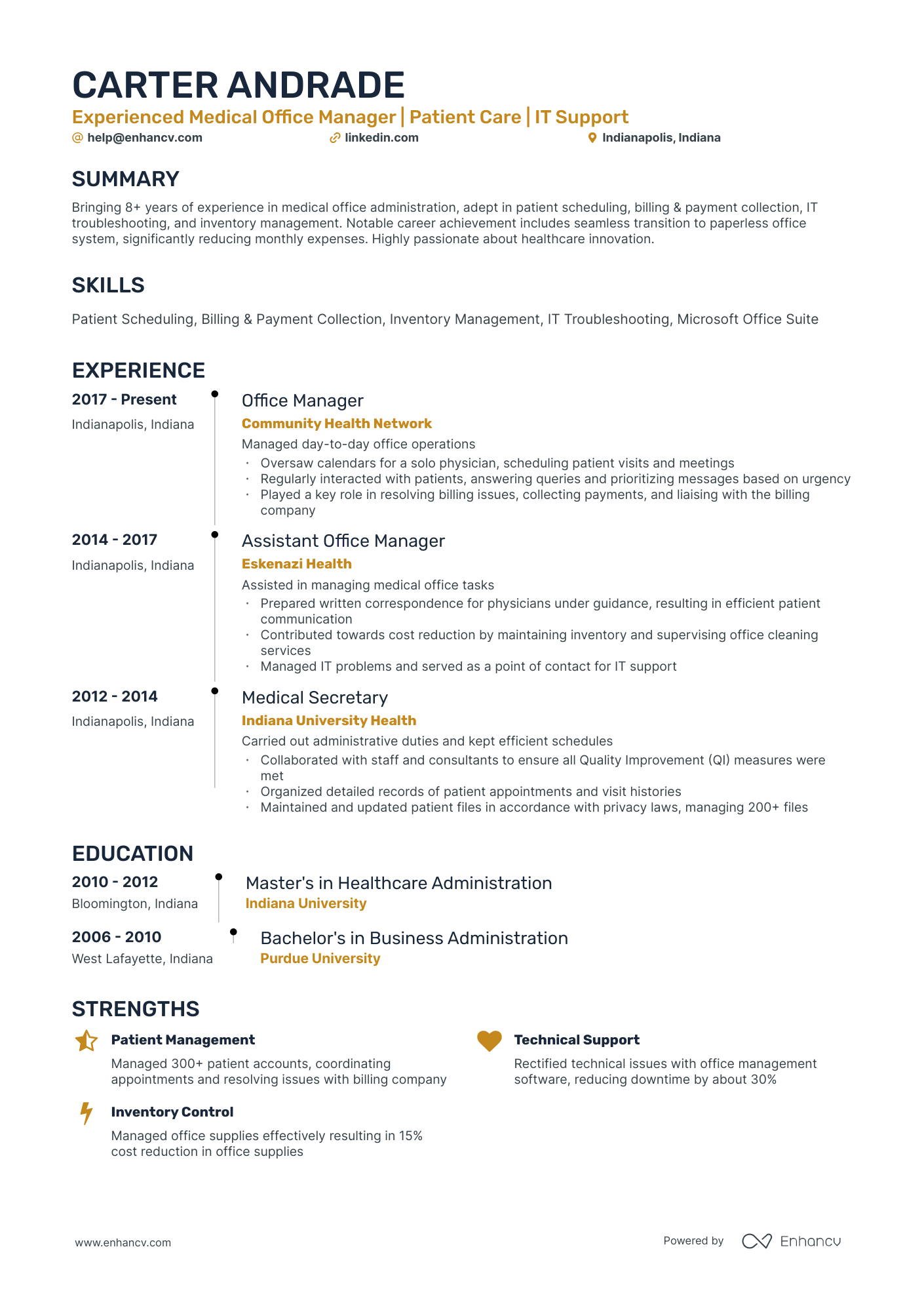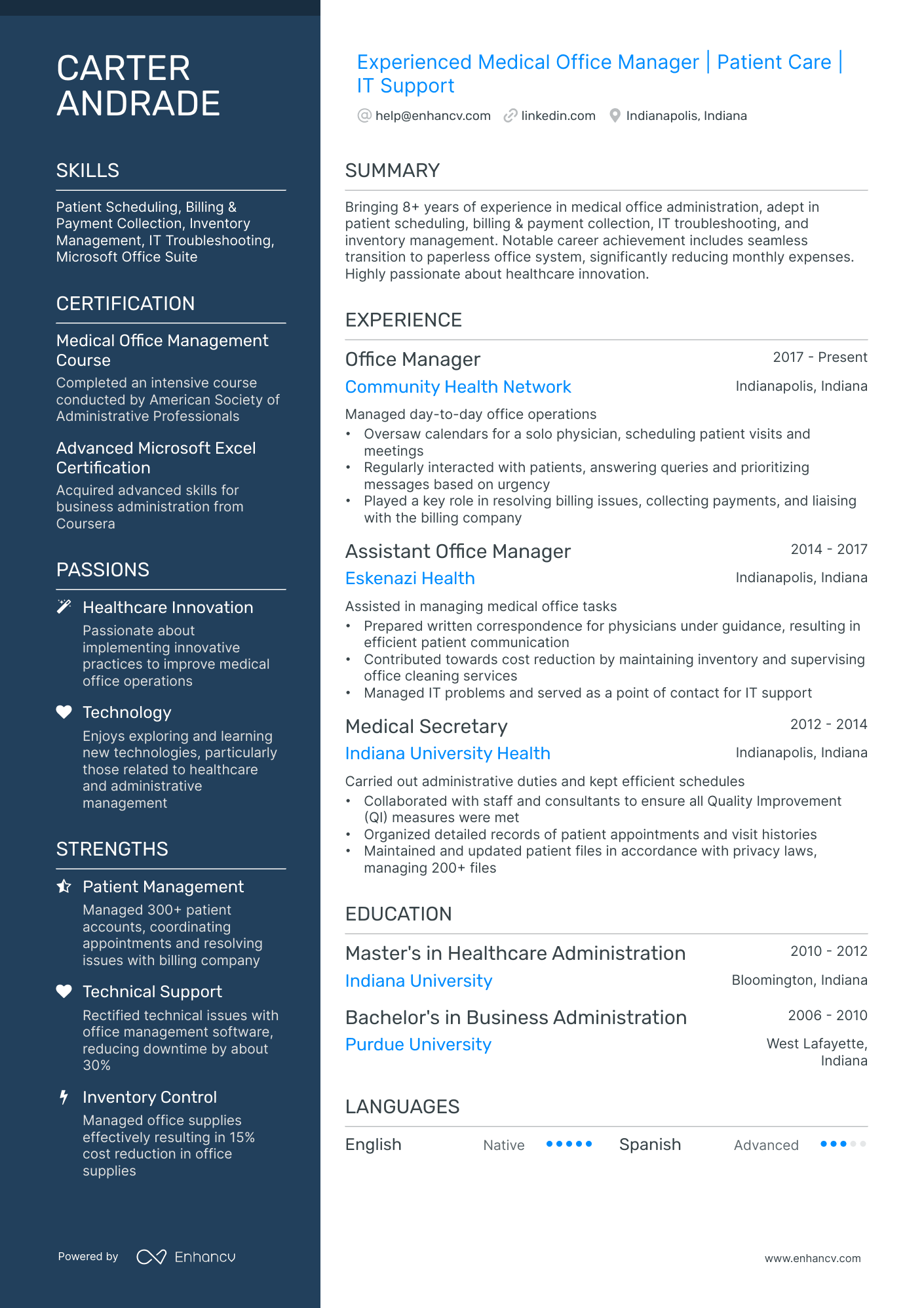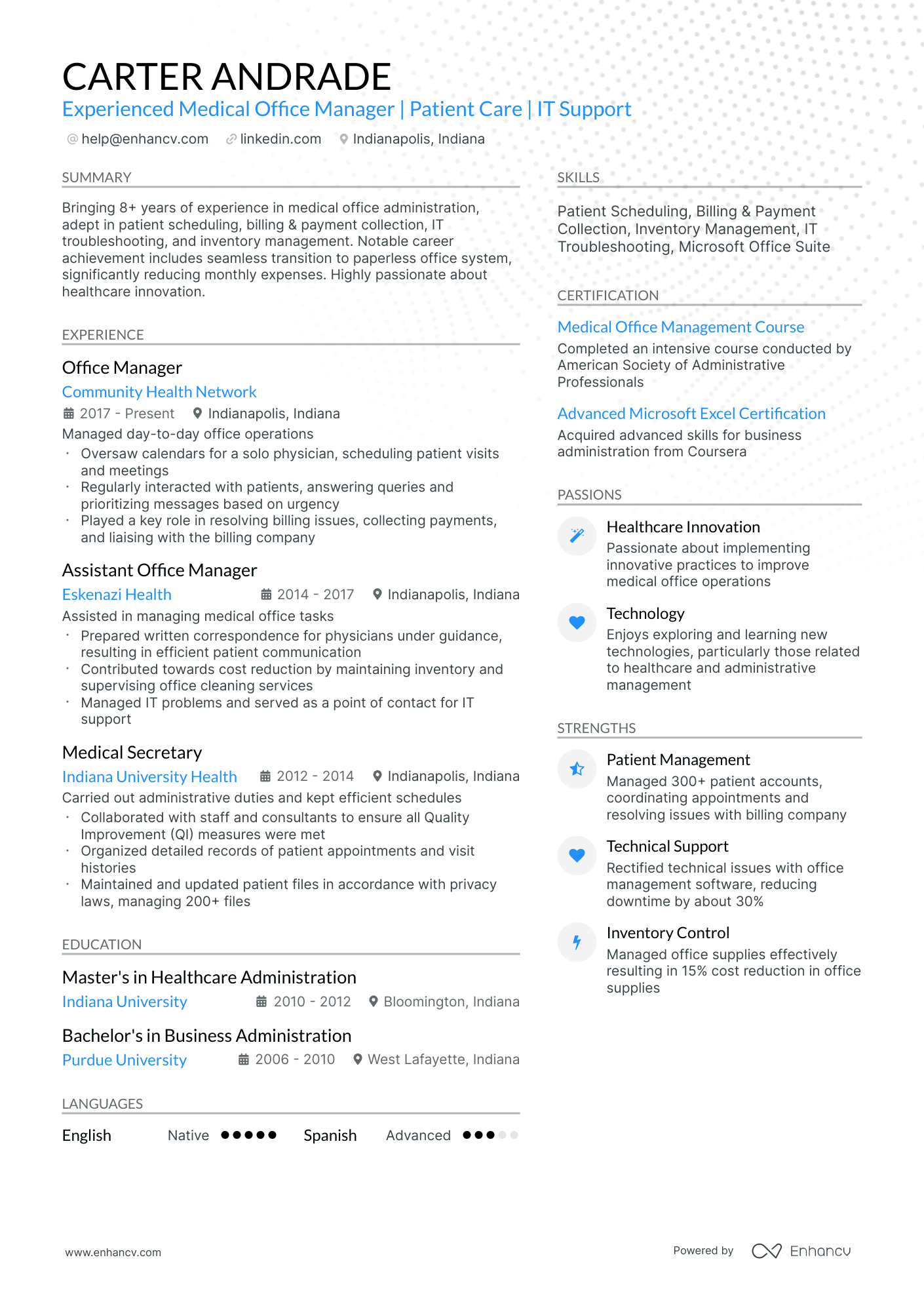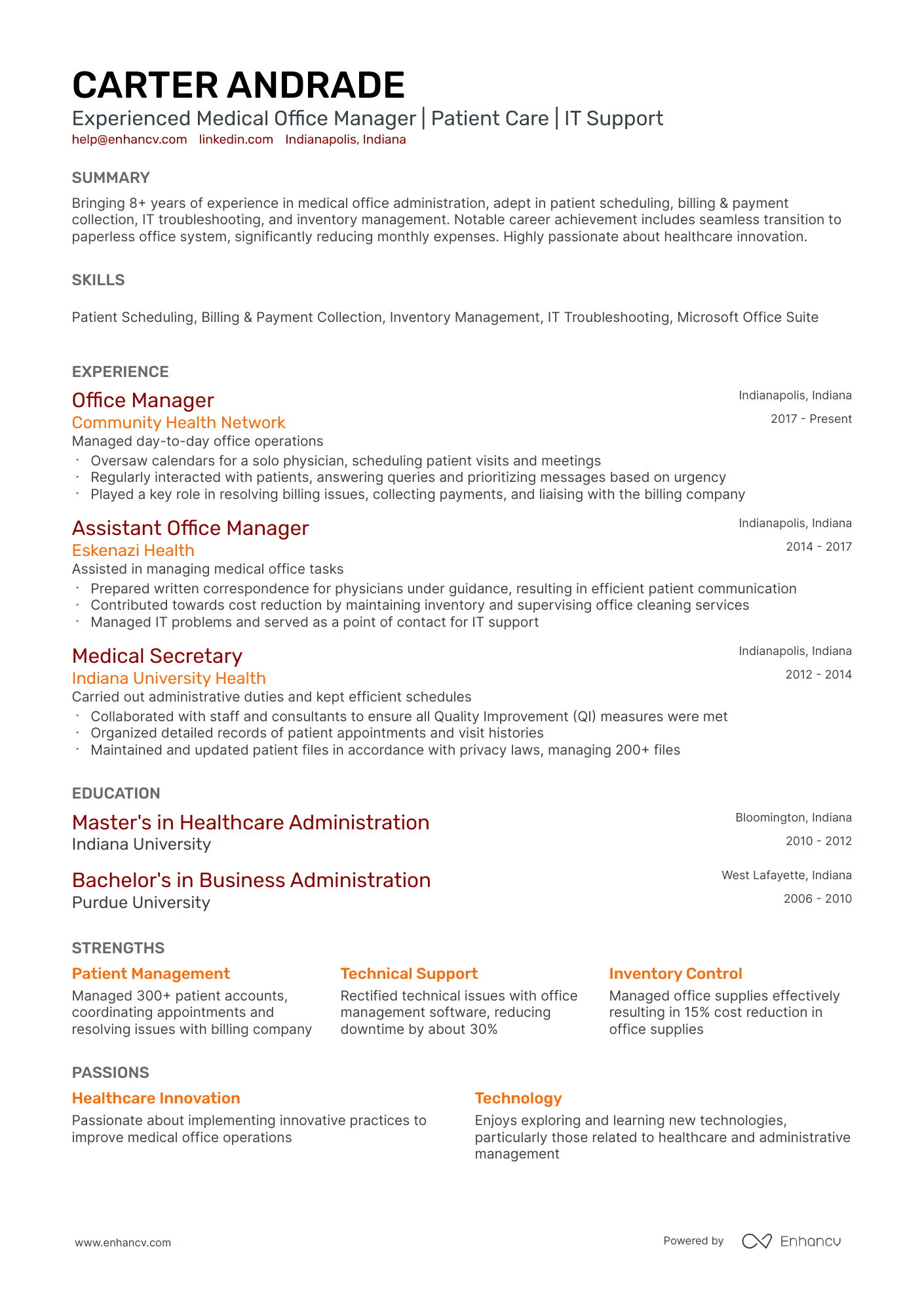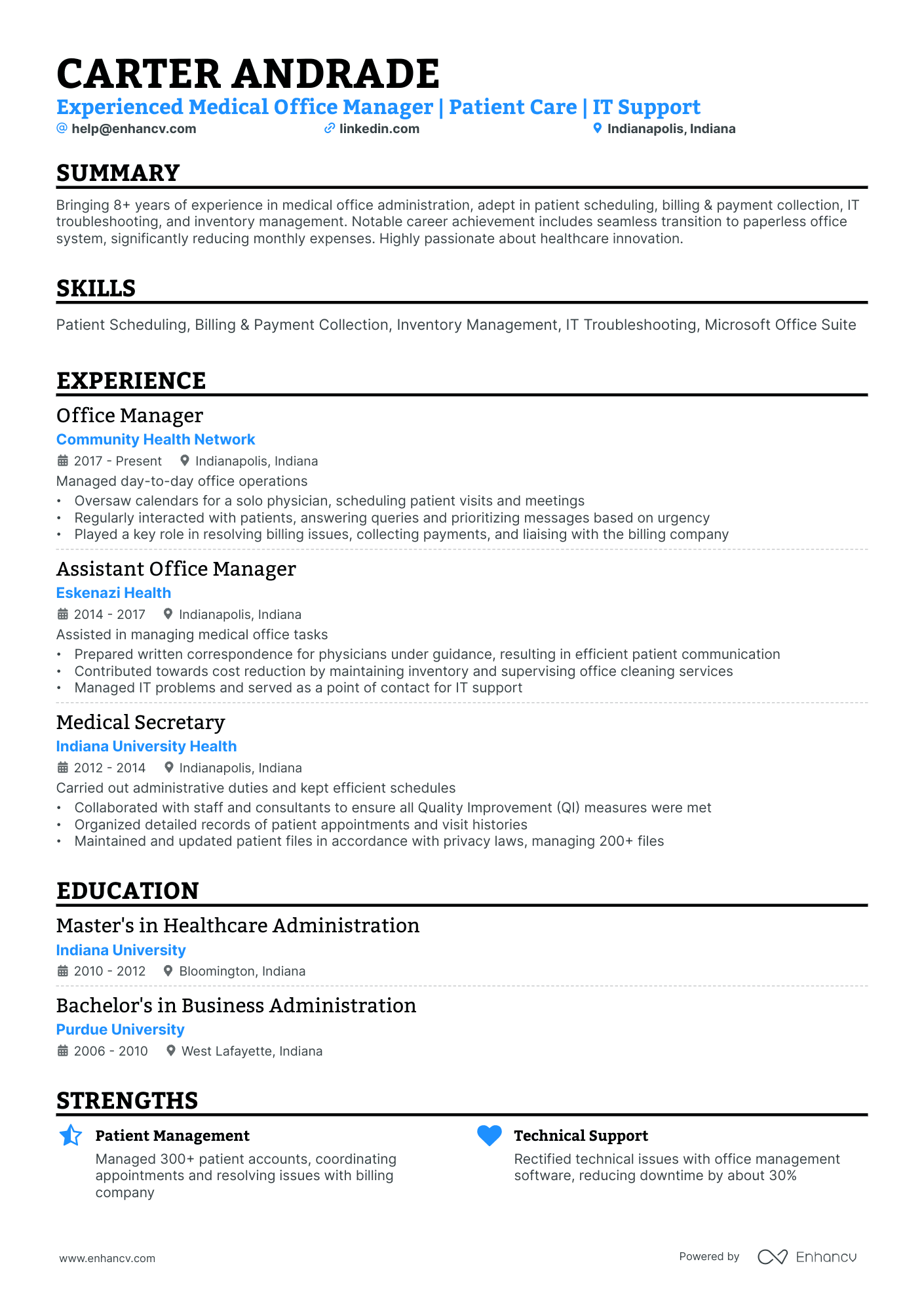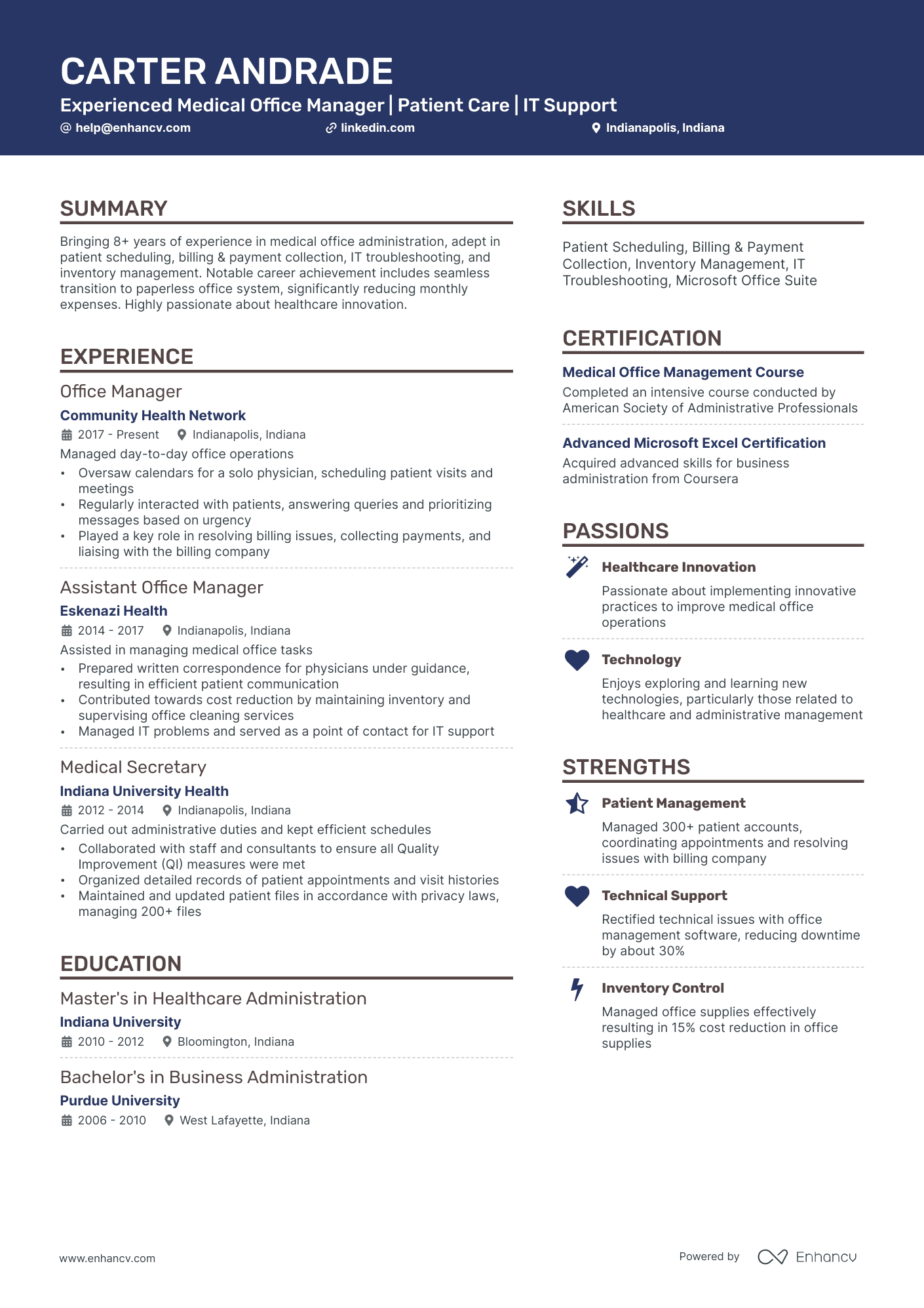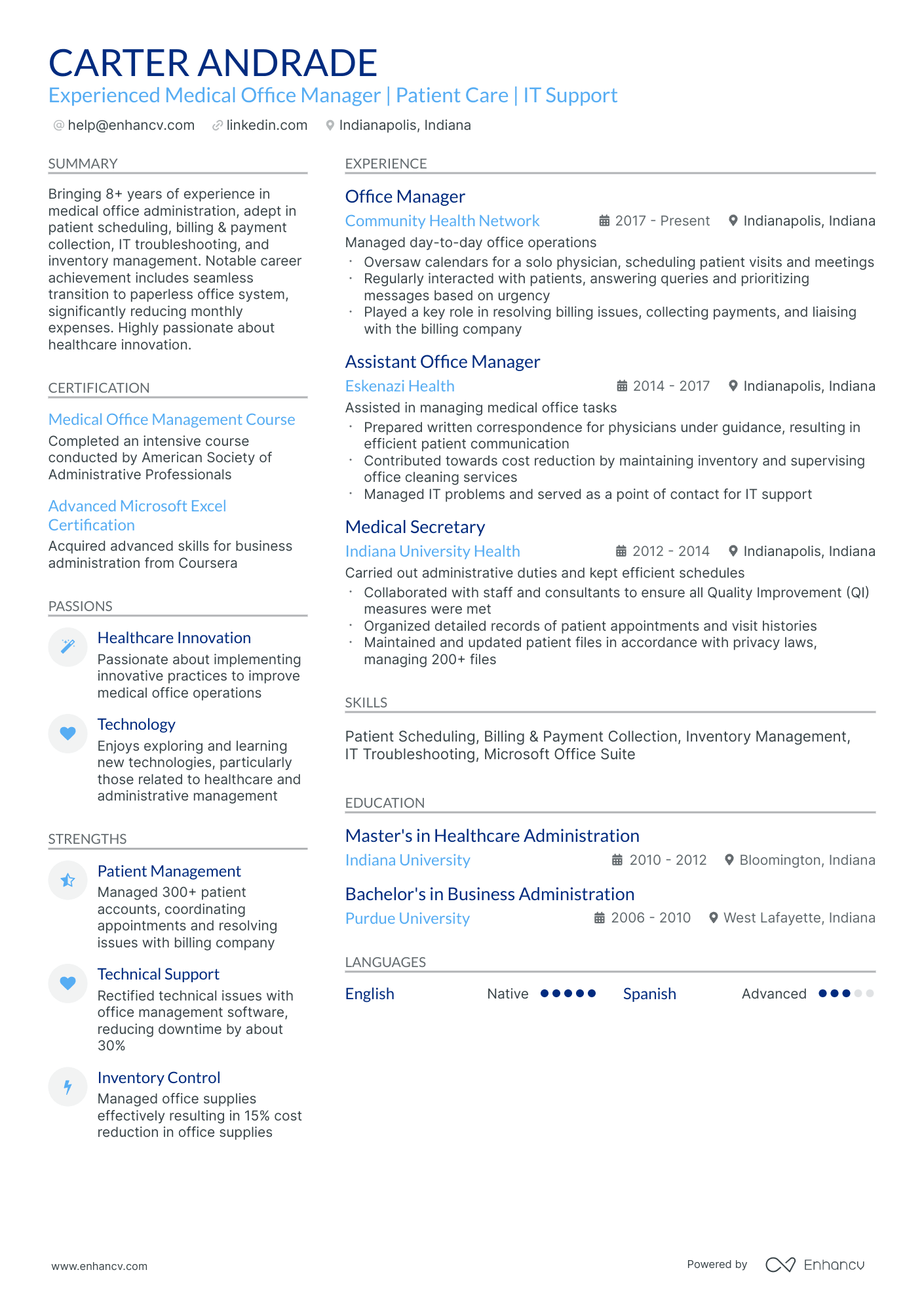One specific challenge faced by medical office managers when crafting their resumes is highlighting the wide range of skills required in this role, such as administrative proficiency, personnel management, billing expertise, and understanding of medical regulations. Our comprehensive guide can assist you by providing targeted examples and customizable templates that showcase these diverse skillsets effectively, enhancing your chances to stand out to potential employers.
Dive into this guide to uncover:
- Top-tier medical office manager resume samples that have successfully landed candidates in leading companies.
- Strategies to direct recruiters' focus towards your standout experiences, notable achievements, and pivotal skills.
- Guidance on crafting resume sections that align closely with the vast majority of job specifications.
- Insights on harmonizing your medical office manager technical prowess with your distinct personality, setting you apart from the competition.
Recommended reads:
crafting an impeccable medical office manager resume format in four steps
Your medical office manager resume format should be both strategic and reader-friendly. Here's a concise guide to help you achieve that:
- Choose a format that aligns with the job's requirements. If your expertise is directly relevant, the reverse-chronological format is ideal. If you're focusing more on skills, consider the functional or hybrid formats.
- Header: Ensure it's populated with accurate contact details and any relevant portfolio links.
- Length: A one-page resume is standard, but if you have extensive experience, extending to two pages is acceptable.
- File type: To maintain formatting consistency, always opt for PDF.
Adjust your resume layout based on the market – Canadian resumes, for example, may follow a unique format.
Upload your resume
Drop your resume here or choose a file. PDF & DOCX only. Max 2MB file size.
Pro tip
Your resume will likely be processed by an Applicant Tracking System (ATS). Ensure your header, summary, or objective incorporates essential skills required for the role.
Key sections to include in your medical office manager resume are:
- The header - with your contact details (like email and phone number), a link to your portfolio, and a headline.
- The summary (or objective) - highlighting the high points of your career so far.
- The experience section - limit yourself to six bullets per role to focus on specific results.
- The skills list - offering a balanced mix of your personal and professional talents.
- Education and certification - displaying your most relevant degrees and certificates for the medical office manager role.
What recruiters want to see on your resume:
- Healthcare Systems Knowledge: Experience with electronic medical records (EMR) systems, medical billing and coding, or other healthcare-related software.
- Management Experience: Proven ability to supervise staff, oversee daily operations, and manage budgets within a healthcare setting.
- Patient Services: A demonstrated commitment to patient satisfaction and service excellence, with experience in handling patient complaints and concerns.
- Compliance Understanding: Familiarity with healthcare laws and regulations, such as HIPAA, and proven ability to ensure office's adherence to these rules.
- Communication Skills: Exceptional interpersonal and communication skills, vital for liaising between physicians, staff, patients, and insurance companies.
Recommended reads:
Optimizing the experience section of your medical office manager resume
The experience section is pivotal—it bridges the gap between your qualifications and the job's requirements.
To craft an impactful medical office manager experience section, consider these guidelines:
- Review the job posting to identify key requirements and align your past roles with these needs.
- Go beyond listing skills—demonstrate their impact through quantifiable achievements.
- Exclude roles that don't enhance your application or showcase relevant skills.
- While technical expertise is crucial, also highlight soft skills that add value to your role.
- Use action verbs to articulate your accomplishments and the skills employed to achieve them.
Below, we've provided medical office manager resume samples to inspire your experience section, ensuring it adheres to industry best practices.
- Managed daily operations of a busy medical office, overseeing a team of 15 staff members.
- Implemented new electronic health record (EHR) system, resulting in improved efficiency and reduced errors by 25%.
- Developed and implemented standardized protocols for patient scheduling, resulting in a 30% decrease in wait times.
- Oversaw billing and coding processes, ensuring timely submission of claims and reducing payment delays by 20%.
- Collaborated with healthcare providers to streamline workflows and optimize patient care delivery.
- Supervised front desk operations and managed patient check-ins, optimizing registration process and reducing wait times by 40%.
- Led training sessions on medical office software for staff, improving their proficiency and accuracy in data entry.
- Developed and implemented quality assurance protocols, resulting in a 20% reduction in documentation errors.
- Collaborated with insurance companies to resolve billing issues, resulting in a 15% increase in claims reimbursement.
- Assisted in the recruitment and hiring process for medical office staff, ensuring optimal team composition.
- Managed patient scheduling and coordinated appointments, maintaining an efficient and organized schedule for healthcare providers.
- Improved office workflow by implementing digital document management system, reducing paper waste by 50%.
- Developed and implemented staff training programs on medical coding and compliance, ensuring adherence to industry regulations.
- Led a team in the implementation of telehealth services, improving access to care for remote patients.
- Collaborated with IT department to address technical issues and optimize the use of electronic medical records (EMR).
- Assisted in managing daily operations of a medical office, ensuring smooth patient flow and efficient resource utilization.
- Provided administrative support to medical staff, including maintaining patient records and handling phone inquiries.
- Implemented a patient feedback system, resulting in improved patient satisfaction scores and positive online reviews.
- Assisted in the development of marketing strategies to attract new patients to the practice.
- Participated in the implementation of an electronic appointment reminder system, reducing no-show rates by 30%.
- Managed administrative operations of a specialized medical clinic, overseeing a team of 10 staff members.
- Implemented a patient-centered care model, resulting in improved patient satisfaction ratings and increased referrals.
- Developed and executed marketing campaigns targeting specific patient demographics, resulting in a 20% increase in new patient acquisition.
- Collaborated with healthcare providers to develop and implement clinical protocols, ensuring standardized and quality care delivery.
- Oversaw inventory management and ordering of medical supplies, optimizing stock levels and reducing costs by 15%.
- Oversee daily operations of a multi-location medical office, with responsibility for staff management and workflow optimization.
- Implement technological solutions to enhance efficiency, such as implementing a patient portal resulting in improved communication and reduced phone inquiries by 30%.
- Lead compliance initiatives, ensuring adherence to HIPAA regulations and maintaining confidentiality of patient information.
- Collaborate with healthcare providers to develop and implement quality improvement initiatives, resulting in enhanced patient outcomes.
- Manage budgeting and financial analysis, identifying cost-saving opportunities and optimizing resource allocation.
- Managed the day-to-day operations of a busy medical office, overseeing a team of 12 administrative and clinical staff members.
- Implemented electronic medical records (EMR) system, resulting in improved accuracy and accessibility of patient records.
- Developed and implemented policies and procedures for insurance billing and reimbursement, reducing claim denials by 25%.
- Led initiatives to enhance patient experience, resulting in increased patient satisfaction scores by 15%.
- Collaborated with healthcare providers to optimize clinic workflows and ensure timely patient care delivery.
- Supervised front desk operations and patient scheduling, ensuring efficient patient flow and minimized wait times.
- Implemented a patient education program, resulting in improved patient compliance with treatment plans and medication adherence.
- Developed and implemented infection control protocols, resulting in zero incidents of healthcare-associated infections.
- Collaborated with insurance companies to negotiate favorable reimbursement rates, resulting in increased revenue for the practice.
- Assisted in the recruitment and training of new staff members, ensuring high-quality service delivery.
- Managed daily operations of a specialized medical office, overseeing administrative staff and coordinating patient care.
- Implemented electronic prescribing system, resulting in improved prescription accuracy and reduced medication errors by 20%.
- Developed and implemented patient satisfaction surveys, resulting in increased overall satisfaction scores by 10%.
- Led the implementation of a centralized medical records system, improving accessibility and continuity of patient care.
- Collaborated with healthcare providers to develop and implement clinical pathways, resulting in standardized and evidence-based care.
- Assisted in managing daily operations of a medical office, overseeing administrative functions and patient services.
- Implemented a patient appointment reminder system, reducing no-show rates by 25% and optimizing appointment utilization.
- Developed and implemented policies for handling patient inquiries and resolving customer service issues.
- Collaborated with IT department to improve the efficiency of the clinic's electronic health record (EHR) system.
- Assisted in the onboarding and training of new staff members, ensuring compliance with office policies and procedures.
The following content includes information from "O*NET OnLine" by the U.S. Department of Labor, Employment and Training Administration (USDOL/ETA). Used under the CC BY 4.0 license. The data represents the top responsibilities present on the task lists for medical office manager professionals.
Top Responsibilities for Medical Office Manager:
- Direct, supervise and evaluate work activities of medical, nursing, technical, clerical, service, maintenance, and other personnel.
- Develop and maintain computerized record management systems to store and process data, such as personnel activities and information, and to produce reports.
- Plan, implement, and administer programs and services in a health care or medical facility, including personnel administration, training, and coordination of medical, nursing and physical plant staff.
- Conduct and administer fiscal operations, including accounting, planning budgets, authorizing expenditures, establishing rates for services, and coordinating financial reporting.
- Maintain awareness of advances in medicine, computerized diagnostic and treatment equipment, data processing technology, government regulations, health insurance changes, and financing options.
- Establish work schedules and assignments for staff, according to workload, space, and equipment availability.
- Monitor the use of diagnostic services, inpatient beds, facilities, and staff to ensure effective use of resources and assess the need for additional staff, equipment, and services.
- Direct or conduct recruitment, hiring, and training of personnel.
- Manage change in integrated health care delivery systems, such as work restructuring, technological innovations, and shifts in the focus of care.
- Maintain communication between governing boards, medical staff, and department heads by attending board meetings and coordinating interdepartmental functioning.
Quantifying impact on your resume
<ul>
Building a medical office manager resume when experience is sparse
If you're light on relevant experience, consider highlighting:
- Short-term roles or internships undertaken during your academic years.
- Contractual roles, emphasizing their relevance and the outcomes achieved.
- Alternative resume formats, such as functional or hybrid, that spotlight your skills.
- Research roles, especially if they involved significant projects or if your contribution was pivotal to the project's success.
Recommended reads:
Pro tip
Your experience section should be a testament to your professional growth. If your career journey isn't particularly linear or impressive, focus on detailing specific skills and the tangible outcomes of your responsibilities.
creating your medical office manager resume skills section: balancing hard skills and soft skills
Recruiters hiring for medical office manager roles are always keen on hiring candidates with relevant technical and people talents.
Hard skills or technical ones are quite beneficial for the industry - as they refer to your competency with particular software and technologies.
Meanwhile, your soft (or people) skills are quite crucial to yours and the company's professional growth as they detail how you'd cooperate and interact in your potential environment.
Here's how to describe your hard and soft skill set in your medical office manager resume:
- Consider what the key job requirements are and list those towards the top of your skills section.
- Think of individual, specific skills that help you stand out amongst competitors, and detail how they've helped you succeed in the past.
- Look to the future of the industry and list all software/ technologies which are forward-facing.
- Create a separate, technical skills section to supplement your experience and further align with the medical office manager job advert.
Find the perfect balance between your resume hard and soft skills with our two lists.
Top skills for your medical office manager resume:
Electronic Health Records (EHR) Management
Medical Billing and Coding
Practice Management Software
Health Information Technology
Insurance Verification Processes
Data Analysis and Reporting
Compliance Regulations (HIPAA, etc.)
Scheduling Software
Patient Management Systems
Microsoft Office Suite
Leadership
Communication
Problem-Solving
Time Management
Customer Service
Team Collaboration
Adaptability
Conflict Resolution
Attention to Detail
Organizational Skills
Next, you will find information on the top technologies for medical office manager professonals from "O*NET OnLine" by the U.S. Department of Labor, Employment and Training Administration (USDOL/ETA). Used under the CC BY 4.0 license.
Top technologies for Medical Office Manager’s resume:
- eClinicalWorks EHR software
- Henry Schein Dentrix
- Blackboard software
- Yardi software
- IBM SPSS Statistics
- SAS
Pro tip
When detailing your skills, align them with the job's requirements. Emphasize unique technical proficiencies and provide examples of your soft skills in action.
Highlighting education and certification on your medical office manager resume
Your education section is a testament to your foundational knowledge and expertise.
Consider:
- Detailing your academic qualifications, including the institution and duration.
- If you're still studying, mention your anticipated graduation date.
- Omit degrees that aren't pertinent to the job.
- Highlight academic experiences that underscore significant milestones.
For medical office manager roles, relevant education and certifications can set you apart.
To effectively showcase your qualifications:
- List all pertinent degrees and certifications in line with the job requirements.
- Include additional certifications if they bolster your application.
- Provide concise details: certification name, institution, and dates.
- If you're pursuing a relevant certification, indicate your expected completion date.
Your education and certification sections validate both your foundational and advanced knowledge in the industry.
Best certifications to list on your resume
Pro tip
Listing your relevant degrees or certificates on your medical office manager resume is a win-win situation. Not only does it hint at your technical capabilities in the industry, but also at a range of soft skills, including perseverance, adaptability, and motivation.
Recommended reads:
Adding a summary or objective to your medical office manager resume
One of the most crucial elements of your professional presentation is your resume's top one-third.
This most often includes:
- Either a resume summary - your career highlights at a glance. Select the summary if you have plenty of relevant experience (and achievements), you'd like recruiters to remember about your application.
- Or, a resume objective - to showcase your determination for growth. The perfect choice for candidates with less experience, who are looking to grow their career in the field.
If you want to go above and beyond with your medical office manager resume summary or resume objective, make sure to answer precisely why recruiters need to hire you.
What is the additional value you'd provide to the company or organization?
Now here are examples from real-life medical office manager professionals, whose resumes have helped them land their dream jobs:
Resume summary and objective examples for a medical office manager resume
Dynamic professional with 5 years' experience in healthcare administration, adept at streamlining operations and improving workflow efficiency. Proven ability to manage a diverse range of medical office duties with a deep understanding of healthcare regulations and excellent patient service skills. Implemented a new appointment scheduling system that increased patient satisfaction by 30%.
Inspiring leader with 8 years as an Operations Manager ready to bring transferable skills to the healthcare industry. Demonstrated proficiency in team management, financial oversight, and process improvements. Successfully led a team of 20+ staff and reduced operational costs by 15% in previous role.
Veteran educator with over 10 years' experience, eager to transition into healthcare management. Excellent organizational skills, capable of handling high-stress situations, and knowledgeable about administrative tasks. Notably increased school performance rating by 25% through strategic planning and leadership.
Experienced Project Manager with a decade's experience in IT, keen on transitioning to a medical office manager position. Superior organizational abilities, combined with outstanding communication skills and a knack for problem-solving. Spearheaded a project that saved the company $500,000 annually.
Eager to apply my strong administrative and organizational skills to a medical office manager position. With solid knowledge of healthcare policies and procedures, I aim to facilitate smooth and efficient office operation while ensuring exceptional patient care and support.
Recent graduate in Healthcare Administration aspiring to leverage academic knowledge in a practical setting as a medical office manager. Committed to providing comprehensive support to practitioners and patients alike, fostering an environment of excellence and growth.
Optimize your resume summary and objective for ATS
Drop your resume here or choose a file.
PDF & DOCX only. Max 2MB file size.
Extra sections to include in your medical office manager resume
What should you do if you happen to have some space left on your resume, and want to highlight other aspects of your profile that you deem are relevant to the role?
Add to your medical office manager resume some of these personal and professional sections:
- Passions/Interests - to detail how you spend both your personal and professional time, invested in various hobbies;
- Awards - to present those niche accolades that make your experience unique;
- Publications - an excellent choice for professionals, who have just graduated from university or are used to a more academic setting;
- < a href="https://enhancv.com/blog/volunteering-on-resume/"> Volunteering - your footprint within your local (or national/ international) community.
Key takeaways
- Your resume should be a curated narrative, highlighting your alignment with the role's requirements.
- Strategically position your skills, balancing both technical and interpersonal strengths.
- Be selective in detailing experiences, focusing on relevance and impact.
- Utilize the summary or objective to offer a snapshot of your professional essence.
- Across all sections, prioritize authenticity and clarity, ensuring your resume resonates with the medical office manager role you're eyeing.
